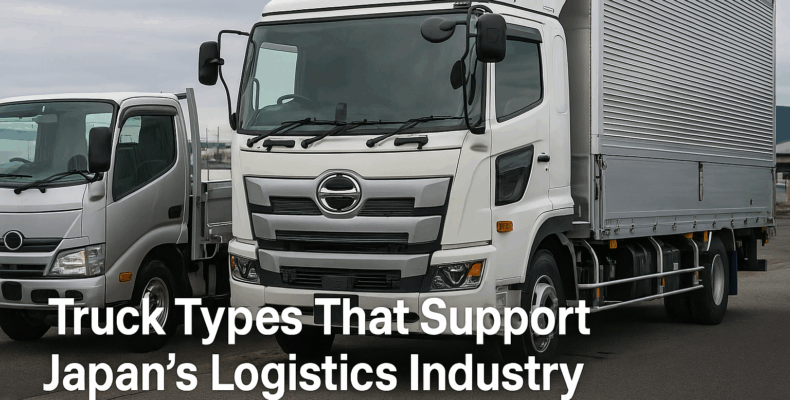Truck Types That Support Japan’s Logistics Industry
Japan’s logistics industry is a highly efficient network that moves goods across cities, rural areas, and international ports. At the heart of this system are versatile and reliable trucks, designed to handle a variety of transport needs. From compact delivery vehicles to massive long-haul trucks, each type plays a crucial role in keeping the economy running smoothly.
In this article, we explore the main categories of trucks that drive Japan’s logistics success, and we’ll also share how you can purchase these vehicles from trusted exporters.
1. Light-Duty Trucks (Kei Trucks and Small Delivery Vehicles)
Light-duty trucks, including the popular kei trucks, are essential for navigating Japan’s narrow streets and urban environments. They are perfect for last-mile deliveries, small cargo loads, and frequent short trips.
Brands such as Suzuki Carry, Daihatsu Hijet, and Mitsubishi Minicab dominate this category. Their compact size allows easy maneuvering, while their fuel efficiency makes them cost-effective for small businesses.
2. Medium-Duty Trucks
Medium-duty trucks, like the Isuzu Elf and Hino Dutro, form the backbone of city logistics and regional deliveries. These trucks can carry heavier loads while still being agile enough for urban routes.
They are frequently used for transporting food products, retail goods, and industrial supplies. Because they balance capacity and mobility, medium-duty trucks are in high demand across Japan and in many export markets.
3. Heavy-Duty Trucks
When it comes to long-distance freight and bulk transport, heavy-duty trucks are the stars of the road. Models like the Mitsubishi Fuso Super Great and Hino Profia can haul massive loads efficiently.
They are widely used for container transport, construction materials, and cross-country deliveries. Equipped with powerful diesel engines, they deliver both strength and durability—key traits for international buyers.
4. Refrigerated Trucks
Temperature-controlled logistics is critical in Japan’s food and pharmaceutical sectors. Refrigerated trucks, often built on Isuzu, Hino, or Toyota Dyna platforms, ensure goods arrive fresh and safe.
These vehicles feature insulated bodies and advanced cooling systems, making them a must-have for businesses that transport perishable goods.
5. Specialized Trucks
The logistics industry also relies on specialized trucks such as tankers, car carriers, and crane trucks. These vehicles are designed for niche industries, from fuel delivery to vehicle transport.
Their versatility ensures that even the most unique transportation needs can be met efficiently.
6. Partnering with Trusted Exporters
If you plan to purchase a Japanese truck for your business, working with reliable exporters is essential. We recommend the
Top 5 Trusted Japanese Used Truck Exporters for Global Buyers.
These Japan-based companies offer detailed inspections, transparent pricing, and secure international shipping. Their expertise helps you choose the right truck type for your market.
7. Why Japanese Trucks Are Popular Internationally
-
High Reliability: Built to last with strict quality control.
-
Fuel Efficiency: Engines designed for economy and performance.
-
Variety: Options from small kei trucks to massive heavy haulers.
-
Ease of Maintenance: Wide availability of spare parts worldwide.
Conclusion
Japan’s logistics industry depends on a diverse fleet of trucks, each tailored to specific transport needs. Whether you require a nimble light-duty truck, a powerful heavy-duty hauler, or a specialized refrigerated unit, Japanese trucks deliver unmatched quality and performance.
When buying for export, always work with experienced professionals like those listed in the
Top 5 Trusted Japanese Used Truck Exporters for Global Buyers to ensure a smooth, safe, and cost-effective transaction.
